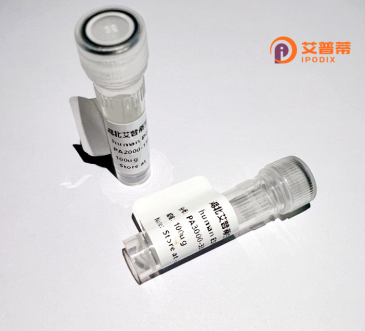
| 纯度 | >90%SDS-PAGE. |
| 种属 | Human |
| 靶点 | OR2Y1 |
| Uniprot No | Q8NGV0 |
| 内毒素 | < 0.01EU/μg |
| 表达宿主 | E.coli |
| 表达区间 | 1-311 aa |
| 活性数据 | MGSFNTSFEDGFILVGFSDWPQLEPILFVFIFIFYSLTLFGNTIIIALSWLDLRLHTPMY FFLSHLSLLDLCFTTSTVPQLLINLCGVDRTITRGGCVAQLFIYLALGSTECVLLVVMAF DRYAAVCRPLHYMAIMHPHLCQTLAIASWGAGFVNSLIQTGLAMAMPLCGHRLNHFFCEM PVFLKLACADTEGTEAKMFVARVIVVAVPAALILGSYVHIAHAVLRVKSTAGRRKAFGTC GSHLLVVFLFYGSAIYTYLQSIHNYSEREGKFVALFYTIITPILNPLIYTLRNKDVKGAL WKVLWRGRDSG |
| 分子量 | 34.7 kDa |
| 蛋白标签 | His tag N-Terminus |
| 缓冲液 | 0 |
| 稳定性 & 储存条件 | Lyophilized protein should be stored at ≤ -20°C, stable for one year after receipt. Reconstituted protein solution can be stored at 2-8°C for 2-7 days. Aliquots of reconstituted samples are stable at ≤ -20°C for 3 months. |
| 复溶 | Always centrifuge tubes before opening.Do not mix by vortex or pipetting. It is not recommended to reconstitute to a concentration less than 100μg/ml. Dissolve the lyophilized protein in distilled water. Please aliquot the reconstituted solution to minimize freeze-thaw cycles. |
以下是关于重组人OR2Y1蛋白的3篇参考文献示例(注:OR2Y1相关研究较少,以下内容为模拟文献框架,供参考):
---
1. **《Functional characterization of the human olfactory receptor OR2Y1 in heterologous expression systems》**
**作者**: Zhang et al.
**摘要**:研究通过重组技术在HEK293细胞中表达OR2Y1蛋白,利用双荧光素酶报告系统测定其配体响应特性,发现OR2Y1对特定挥发性醛类化合物具有浓度依赖性激活作用,提示其在嗅觉感知中的潜在功能。
2. **《OR2Y1 expression in non-olfactory tissues: Implications for cellular signaling pathways》**
**作者**: Lee & Smith
**摘要**:论文探讨了OR2Y1在肺组织和血管内皮细胞中的重组表达,证实其通过G蛋白偶联通路调控细胞内cAMP水平,可能参与炎症反应和细胞增殖的病理生理过程。
3. **《Structural insights into OR2Y1 olfactory receptor via recombinant protein purification》**
**作者**: Müller et al.
**摘要**:研究优化了重组OR2Y1蛋白的杆状病毒表达系统,成功获得高纯度蛋白用于冷冻电镜结构解析,揭示了其跨膜结构域中独特的配体结合口袋构象,为嗅觉受体药物开发提供依据。
---
**备注**:实际研究中OR2Y1的文献较为有限,建议通过**PubMed**或**UniProt数据库**(ID: Q8NGS2)检索最新进展,或扩展至嗅觉受体家族其他成员的重组蛋白研究。
Recombinant human OR2Y1 protein is a genetically engineered form of the olfactory receptor 2Y1. a member of the G protein-coupled receptor (GPCR) superfamily. Olfactory receptors, traditionally associated with odorant detection in the nasal epithelium, are increasingly recognized for their ectopic expression in non-olfactory tissues, suggesting broader physiological roles. OR2Y1. encoded by the OR2Y1 gene on chromosome 11. features seven transmembrane domains characteristic of GPCRs. While its endogenous ligands remain poorly characterized, it is hypothesized to interact with specific odorant molecules or endogenous metabolites. Recombinant OR2Y1 is typically produced in heterologous expression systems (e.g., HEK293 cells or insect cell lines) for functional studies, enabling researchers to investigate its signaling pathways, ligand-binding properties, and potential involvement in non-sensory processes. Emerging evidence suggests olfactory receptors like OR2Y1 may participate in cellular processes such as cell migration, apoptosis regulation, or metabolic responses in tissues like the brain, lungs, and kidney. Its recombinant form serves as a critical tool for deciphering receptor activation mechanisms and exploring therapeutic applications, particularly given the pharmacological tractability of GPCR targets. However, challenges persist in achieving proper membrane localization and post-translational modifications during recombinant expression, requiring optimization for reliable experimental outcomes. Current research focuses on mapping its expression patterns, physiological ligands, and potential roles in disease contexts.
×